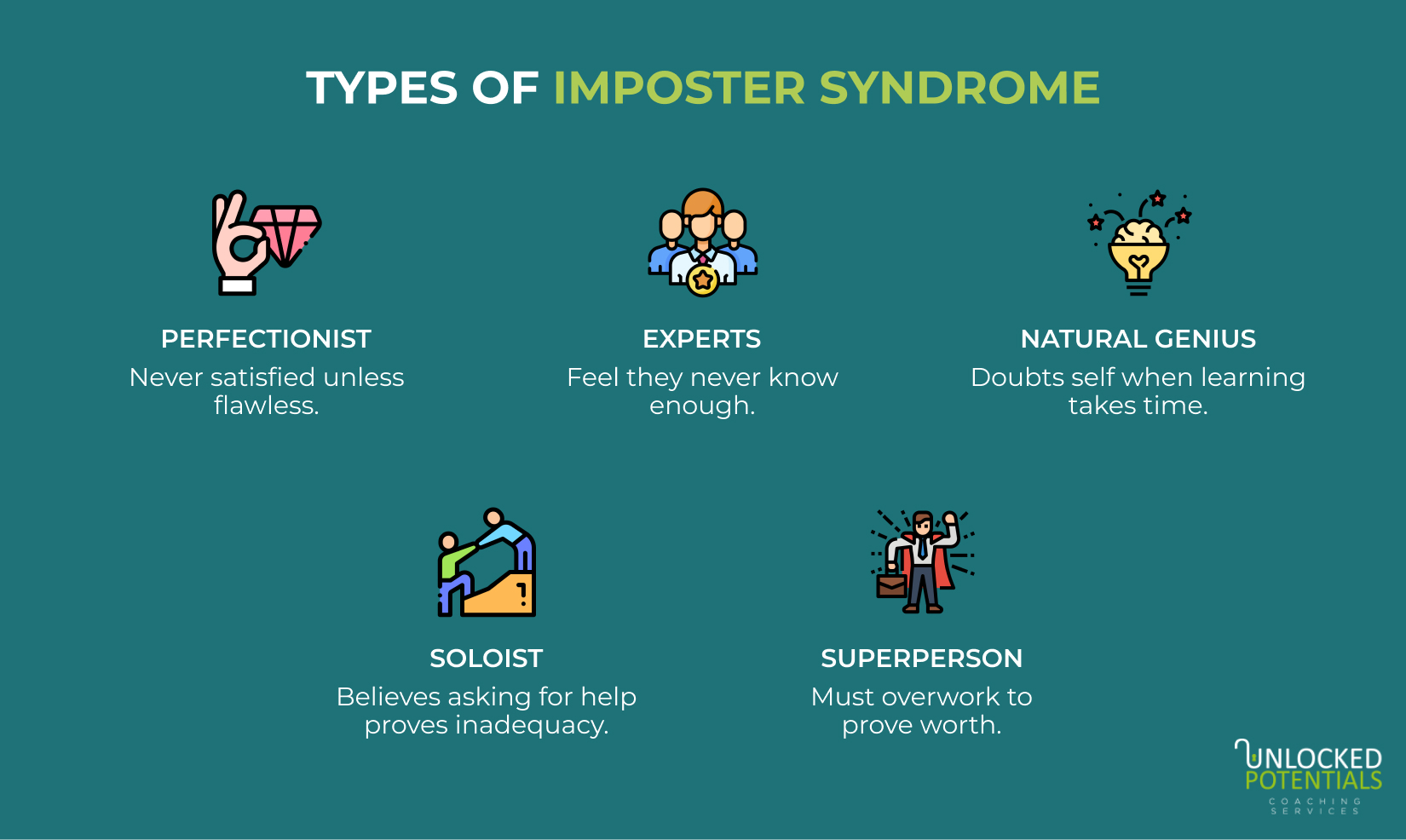Imposter Syndrome: Meaning, Types, How Coaching Can Help

Many people, even those with proven skills and experience, sometimes feel as though they do not truly deserve their achievements. This experience is known as Imposter Syndrome. It involves persistent self-doubt, a fear of being “found out,” and a tendency to attribute success to luck or external factors rather than ability.
Imposter Syndrome is not a sign of poor performance. In fact, it often affects capable, high-achieving individuals. Understanding it can help you recognise when these thoughts arise and prevent them from holding you back.
In this article, we will explore what Imposter Syndrome means, the different ways it can show up, and how coaching can support you in building confidence and embracing your achievements.
What Is Imposter Syndrome
Imposter Syndrome is the ongoing experience of doubting your skills, achievements, or qualifications, even when there is clear evidence that you are competent. It often includes a fear of being exposed as less capable than others believe you to be. People with Imposter Syndrome may attribute their success to luck, timing, or external help, rather than their own abilities.
It is not recognised as a mental health diagnosis but is widely understood as a common psychological pattern that can affect anyone, regardless of their role, experience, or background. Research shows that these feelings often persist despite consistent accomplishments.
The term was first introduced in the late 1970s by psychologists Suzanne Imes and Pauline Clance, who initially studied it among high-achieving women. Later research confirmed that it can affect people of all genders and professions. Understanding the nature of Imposter Syndrome is an important first step towards addressing it and building a more accurate view of your abilities.
What It Feels Like to Live With Imposter Syndrome
Living with Imposter Syndrome often means carrying a constant sense of self-doubt, even in areas where you are skilled and experienced. You may find it difficult to accept praise, feeling that others have overestimated your abilities. Successes can feel temporary or undeserved, and you might put them down to luck or the help of others rather than your own effort.
Common signs include worrying about being “found out,” feeling pressure to work harder than necessary to prove yourself, and setting unrealistically high standards that are difficult to meet. Mistakes, even small ones, may stay in your mind far longer than your achievements. You might also avoid new opportunities because of the fear that you will not perform well enough.
These thoughts and feelings can be persistent, regardless of the evidence of your competence. Recognising them as part of a common pattern is the first step towards challenging them and developing a more balanced, realistic perspective of your skills.
The Five Types of Imposter Syndrome
Researcher Dr Valerie Young identified five main types of Imposter Syndrome. Each reflects a different way of setting unrealistic expectations for oneself and undervaluing genuine achievement.
1. Perfectionist
Measures success by achieving flawless results. Even minor mistakes are magnified, creating ongoing dissatisfaction and the belief that nothing is ever “good enough.” This can lead to over-preparation, missed deadlines, and avoidance of opportunities for fear of falling short.
2. Expert
Believes competence requires knowing everything before taking action. Any gap in knowledge is seen as proof of inadequacy. This can result in spending excessive time on research or training and reluctance to share ideas until they feel fully qualified.
3. Natural Genius
Assumes ability should come easily and quickly. If a task takes effort or repeated attempts, they interpret it as a lack of talent. This belief can discourage persistence and limit skill development.
4. Soloist
Equates asking for help with weakness. They prefer to work independently, even when collaboration would be more efficient, which can create unnecessary pressure and isolation.
5. Superperson
Feels compelled to excel in every role and outperform others. They often work longer hours, take on more than is reasonable, and push themselves beyond healthy limits to prove their worth.
Root Causes and Triggers
Imposter Syndrome often develops when early experiences, personality traits, and environmental pressures combine to shape how you judge your own abilities. These factors can reinforce the belief that competence must be constantly proven and that success is fragile or undeserved.
Family upbringing and achievement pressure
If you grew up in an environment where approval was linked to high performance, you may have learned to equate self-worth with achievement. Inconsistent feedback, such as alternating between praise and criticism, can create uncertainty about whether success is genuine or sustainable. Overly critical or controlling parenting can also make you doubt your competence, even when you perform well.
Personality traits
Perfectionism drives the need to meet unrealistically high standards, making even small mistakes feel like failures. Low self-efficacy limits belief in your ability to handle challenges, leading you to undervalue successes. High neuroticism increases sensitivity to criticism and amplifies worry, which can keep self-doubt active.
Social and cultural factors
Being part of an underrepresented group or feeling different from peers can heighten awareness of how you are perceived, making you more likely to over-analyse performance. Cultural norms that emphasise humility or discourage self-promotion can also make it harder to internalise achievements.
Transitions and new roles
Entering a new position or environment can magnify uncertainty, particularly when you lack benchmarks for success in that setting. Without a history of achievement in the new role, it can feel as though you have yet to “earn” your place.
Comparison culture and social media
Constant exposure to selective portrayals of success can distort your perception of what is normal, leading you to underestimate your own accomplishments and overestimate others’ abilities. This reinforces the idea that you are falling short, even when you are meeting or exceeding expectations.
The Cost of Carrying the Imposter Feeling
Living with Imposter Syndrome can affect both professional performance and personal well-being. While some people use self-doubt as motivation to work harder, the long-term effects are often negative and can outweigh any short-term gains.
- Emotional strain – Persistent feelings of inadequacy can lead to heightened anxiety, reduced self-esteem, and, over time, symptoms of depression. The constant fear of being “found out” keeps the mind in a state of tension, making it harder to focus or think clearly.
- Burnout – The need to overprepare or work excessively to maintain a sense of legitimacy can cause physical and mental exhaustion.
- Missed opportunities – Doubting your readiness or worth can lead to turning down promotions, avoiding new projects, or hesitating to put forward ideas. Over time, this limits career growth and personal development.
- Strained relationships – Reluctance to share achievements or accept praise can create distance in professional and personal relationships. Overworking can also reduce time and energy for family, friends, and other meaningful activities.
Left unaddressed, these costs can reinforce the very doubts that drive Imposter Syndrome, creating a cycle that becomes harder to break.
How Coaching Can Help Break the Cycle
Coaching offers a structured, forward-focused approach to addressing Imposter Syndrome. While therapy often explores past experiences, coaching centres on identifying current patterns, developing practical strategies, and building confidence through action.
A coach can help you:
- Clarify core beliefs – Identify the assumptions you hold about competence, success, and worth, and examine whether they are accurate or useful.
- Reframe self-doubt – Learn to challenge unhelpful thoughts and replace them with perspectives grounded in evidence.
- Acknowledge achievements – Develop the habit of recognising and recording successes, so they become part of your self-assessment rather than dismissed as luck.
- Set realistic goals – Establish achievable objectives that stretch your abilities without reinforcing perfectionism.
- Strengthen resilience – Build skills to manage comparison, respond to criticism constructively, and maintain perspective under pressure.
Through regular support and accountability, coaching helps create lasting change in how you view your capabilities. Over time, this can reduce the hold of Imposter Syndrome, allowing you to pursue opportunities with greater assurance and balance.
Frequently Asked Questions
How common is Imposter Syndrome in the UAE workplace?
It is more common than many realise. In the UAE’s diverse and competitive job market, professionals often work alongside people from different backgrounds and industries. This can make it easy to compare yourself to others and question your capabilities, even when your performance is strong.
Can Imposter Syndrome affect career growth in the UAE?
Yes. If you regularly doubt your abilities, you might avoid applying for promotions, hesitate to speak up in meetings, or turn down leadership roles. Over time, this can slow your career progression, even if you have the skills to succeed.
Is Imposter Syndrome the same as lacking confidence?
Not exactly. You can appear confident to others and still experience Imposter Syndrome. The key difference is that the self-doubt continues despite evidence of success, making it harder to fully acknowledge your achievements.
What role does culture play in Imposter Syndrome here?
In a multicultural environment like the UAE, cultural expectations can influence how people present their achievements. Some may be taught to stay modest, while others may feel pressure to constantly prove themselves. Both can contribute to the imposter mindset.
How can coaching help with Imposter Syndrome?
At Unlocked Potentials, we focus on helping clients recognise unhelpful thinking patterns, build confidence through achievable goals, and develop strategies to internalise their successes. Coaching provides a safe, confidential space to work through these challenges and approach opportunities with clarity and self-trust.
- September 2025
- August 2025
- July 2025
- June 2025
- May 2025
- April 2025
- March 2025
- February 2025
- January 2025
- December 2024
- November 2024
- October 2024
- September 2024
- August 2024
- July 2024
- June 2024
- May 2024
- December 2023
- November 2023
- August 2023
- July 2023
- June 2023
- May 2023
- April 2023
- March 2023
- February 2023
- January 2023
- December 2022
- November 2022
- October 2022
- September 2022
- August 2022
- July 2022
- June 2022
- May 2022
- April 2022
- March 2022
- February 2022
- January 2022
- December 2021
- November 2021
- October 2021
- September 2021
- August 2021
- July 2021
- June 2021
- May 2021
- April 2021
- March 2020
- February 2020
- January 2020
- December 2019
- November 2019
- October 2019
- September 2019
- August 2019
- July 2019
- June 2019
- May 2019
- April 2019
- March 2019
- February 2019
- January 2019
- December 2018
- November 2018
- October 2018
- September 2018
- August 2018
- July 2015
- May 2014








